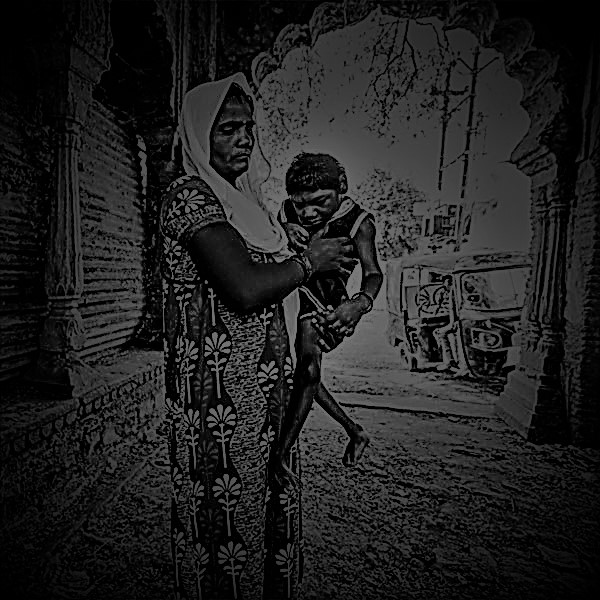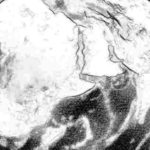
Aasha wrapped the leftover rotis from last night’s dinner in a faded, tattered cloth. The cloth seemed to be yielded by a worn-out lungi. The part of the rotis, which were over-baked, visible from the frayed patches, looked like black pustules on pale skin. She kept the thin wad in the outer pocket of Raghu’s basta, rolled over its rugged canvas upper flap, and pressing the basta at its various panels, fastened the latches. Her hand span, while fastening them, was no less than a complacent yawning mouth, with the thumb on the upper flap and forefinger on the latch. The muted click sound of those shoddy aluminum latches was enough to balm her frowning forehead.
She slung the bulging basta over her feeble shoulder. The strain of the rugged canvas strap was enough to prop a nuanced shallow chasm among the loosely gathered pleats of her pallu. Those pleats were the trough to the peaking ghoonghat, which was no less than a sand dune when casting a closer glance. Her eyes, which looked chronically jaundiced, were veiled, for they would itch inexorably, and the resulting purplish puffy tear duct with scarlet tear line rimming the yellow sclera was a nightmare in daylight.
She called out in a dry voice, “O Raghu lalla…O lalla… Chal Naa” (O Raghu Dear, Let’s go), while holding out her free hand. Within a few minutes, Raghu slipped his sepia fingers, which were frail yet confident, over Aasha’s scorched palm. That momentary union seemed to mist into an illusionary umbilical cord that emerged from his dark, shrunken shoulder blade to her parched and sleek forearm. The cord which wasn’t macerated like jelly, but was hard, bony, chestnut-like, gleaming of courage, yet the misery congealed in the veins underneath.
Aasha was abandoned by her husband, for her inability to reproduce further at an early age. After Raghu, she had stillbirths thrice and was afflicted with low estrogen levels.
Raghu was of a scrawny physique, and at the age of 6, his appearance – dry, unkempt hair covering his forehead and goggly eyes, distant with perpetual hope- was frail as a reed.
His faded polyester shirt’s front placket tracing the contours of his front body, from his sleek chest to weak belly sticking out, appears sinuous. The back yoke, armhole, and collar stand seem to be a mystic fuse, where the shirt blatantly refuses to identify between the nape and shoulder blades individually. The fused yard of fabric, gathered in long continuous folds hanging on the sepia bony frame, laid obscurely silent, as if Raghu’s diminutive torso, at every movement, was chiding every thread sewn on the shirt. The back panel of the shirt, which hovered and had never been in contact with his skin, formed a loose triangular space between the fabric and his swaying-in back. The air in that wobbly triangular area scoffed at its own presence. His Khakhi- colored shorts, hanging loosely, looked much like crushed brown craft paper, whose gathered folds rustled faintly at his every stumped gait, only where a small portion of a side is reluctantly puffed as if a pair of buns are resting in that area. The bunny protrusions were his weak buttocks.
No sooner than Raghu had balanced himself on his spindly limbs for a few minutes than Aasha gripped her hand to his rickety arm and assisted him to walk to his school, which was 8kms away from their shack. They stepped outside.
The air felt heavy, and the sky was plaintively bluish. The marshes loomed in heavy, still air, as if swamped in an acrid solvent. Trees looked no more than like frames of a harp, clenching its series of broken strings, only to be plucked by the claws of ravens. After covering half of the distance, despite her mother’s persistent assistance, Raghu would often walk on all his fours! His feebleness would mock his apparently fat calves. They were unhealthily fat. Helpless, Aasha would continue on foot, in a bleak hope that he might resume his posture and gait, which was as though stumped and unbalanced but at least anthropomorphic. Seeing him walking on all fours was pityingly bestial. Her empty hand wading through the heavy air wept silently in maternal remorse. Nothing could be said, nothing could be done.
His palms and the soles of his feet were smeared with cow dung. His nose wrinkled up and his upper lip was pulled up. With squinted eyes, he continued to walk with a calf-like gait through the trail of sludge-green gloop. His olfactory instincts couldn’t abstain from soaking in the stench – adding to his misery. His misery was mitigated a little when he walked across the sheaves of hay that laid barren on the dirt road. His wobbly posture was no less than a crushed, heavy polyester fabric, hung on a hook. His haunches seemed to be moored by an invisible hook, dangling from the sky.
Despite his hollowing frailty, there was a point where he had to resume his anthropomorphic gait. The unpaved path ahead that they had to walk through was in proximity to a murky pond- “zahreela taalab”- as Bhopalis of that area feared it. The surface of the water was as still as a mirror. It would be folly to imagine that mirror as scintillating, for it was a shoddy flashing surface, coated with the amalgam of dumped toxic sludge, greed, and politics. Beneath that stillness was a cauldron of the seething shrieks of December 1984.
The pond had wreaked perpetual havoc in the lives of people living in its proximity. The peripheral sludge around the pond was interspersed with stained paper cups, crushed cans, torn plastic bags, yellow newspapers, used napkins, and fragments of discarded tires.
Once Aasha also lived there, in her early years of childhood. The leaden air she inhaled during those years was now the instigator of her perpetual veil.
The marshy path around the pond was no less than a tongue afflicted with cancer.
Aasha would bring her veil closer to her chin and, clutching it tightly, would try to veil his son’s face in the loosely hung gathers of her saree’s pallu. Their pace was brisked up with horror but slowed with clumsy gaits. After crossing that zone, they would cover the remaining distance by walking through the soggy, unpaved track.
Soon, they would reach the school, which was funded by a child-care organization. The glimpse of the neatly masoned structure of the building that stood in contrast to their thatched shanty was a spasm of shame, but awe, for Aasha.
She dropped Raghu to his classroom, assisting him to sit on chatai, spread across the chipped concrete floor. His puffy calves, though weak, provided him with a cushiony warmth and unexpected assistance. She left the basta near his frailing posture. The room was filled with 3 rows of children, looking like a slab of innocence cast in grim and horror. For Raghu was not the only clumsy and helpless creature. Some were either horrendously disproportionate or blind. But, even in those few hours, each of them would feel a sense of having ‘space’ in their lives, when the wind coming through the large French windows would touch their haggard cheeks.
That day, a drawing competition was organized for the batch, where the children were asked to tune their creativity to the theme- “Happiness for me”.
Raghu unknotted his small potli. The square fabric unfurled a small heap of broken wax crayons. The heap looked like a heap of multicolored gravel and pinches of sand in between. His eyes drank the sweet-greasy smell wafting from the heap in joy.
After two hours of scratching, scribbling, and rendering, there was a vague satisfaction on each one’s face in the rows. Stuti, their teacher, went through the wad of sheets and observed each sheet for at least a few minutes. The jerky strokes, partial colorings, and jagged shapes felt strong enough to cast a light on each of their dark existence. A few had sketched a pile of colorful toffees and candies. One had drawn a prairie of sunflowers on the entire sheet, while the other was a giant plush teddy bear. Some sketches reflected the urgency to advance – an uncolored wobbly rectangle, with colored mini squares floating inside it and three navigation buttons on the thick bold outline of the rectangle – a desire to play on touchscreen gadgets.
The teacher felt an ineffable twinge of gratification when she came across Raghu’s, for he had sketched ‘ two peacocks dancing in the rain’. How such a nuanced event of nature could be the happiness for a child of 6 years was incomprehensible. Was it his unconscious inhibitions which yearned for such poised gait, or was it the overwhelming beauty of the feathers that had left an imprint on him? For whichever way it was, he bagged the first prize. Along with the merit certificate, his prize was a mini hamper inclusive of ‘Classmate’ 12- shades set of crayons, a tetra pack of ‘Frooti’, 2 ‘Parle’ toffees, and a puffed packet of ‘Lays’ chips which gloated- “Betcha can’t eat just one”. No sooner had he kept his prize in his basta, Aasha arrived there. She was panting. She bowed her veiled head, joined her hands in regard, and said, “ Namaste Madamji ! Vo Raghu Ka dakhila -…” (Greetings Ma’am! That Raghu’s registration-…! )
A few kilometers away from the school, there was a children’s organization functioning under the name ‘Baal Vikaas‘, which had registered over 1,000 children every year with disabilities. The aim of development and nurturing sounded hollow, of its erratic functioning, and it was mostly closed. For it had opened almost after five months again that too, for a few hours, Aasha’s agony and importunateness were justified.
Stuti cut her in the middle and said, ” Haan Aashaji. I understand. I just wish that this time Raghu gets successfully registered so that he can be categorized as a victim of gas tragedy. Hopefully, he’d be paid compensation and perhaps proper medical attention. Do take him. “
“Dhanyawad Madamji” said Aasha, while quickly sliding the basta over her shoulder, as usual, clutching her ghoonghat intact and assisting Raghu.
They stepped outside and as they walked at their clumsy rapid pace a few meters; Aasha saw a few ladies along with their children in their arms returning, and waving back to her, they said in a loud dry voice, “Band hai ab, bola…kal AANA“! (It’s closed now, they have asked to come tomorrow!)
What responsibility can be accounted to such an organization, which opens once, after a long interval, and that too for an hour or at most two? The pumpkin face guard patrolling outside would shrug his shoulders and give the visitors a false hope of its functioning the next day as if time was constantly in their lives, and the progress of their existence and events in their lives would be at such a pace, that even after 5-6 months, they would feel it like the next day. Their lives were in misery, but not stagnant. Even misery has its own shades.
The young delegates of day-care centers, in their black long slit kurtas and Kurtis with washed ripped jeans underneath, had been performing street plays for demanding rights for gas victims, but only to be left unheeded by ‘Baal Vikaas‘, which was blatantly erratic and a pirouetting puppet of profits.
Aasha’s dark tawny lips, which were once half-smiling in hope, suddenly shrunk into dismay. With a slouchy stance, she headed her way back to her home, while assisting Raghu.
“Dekh MAA, Naye Rang… Dekh Naa! ” (Look Mother, new colors… please take a look at them!), said Raghu while they were walking. Aasha looked down through her shoulder, saw the packet of crayons that he had received, and had forgotten to keep in his basta and had been holding it in his hand since. She praised him with a faint nod and continued walking.
They again dashed off when they reached proximity to the pond. As usual, Raghu’s face was veiled under the gathers of her pallu. His toe fell on the rim of a crushed can with ‘Coca-Cola’ printed on it and he stumbled over the can. He lurched forward, though didn’t fall as he was clenched by her mother. But the packet of crayons slipped from his clutch, went flying, and fell into that murk with a soft plop. A soft plop, which was deafening for Raghu, for the next few minutes.
As he tried to free himself from her clench, Aasha screamed, “ Chhee! Gandaa ! Chal…chal!” ( Eww! It’s appalling! Come along! )
Raghu stifled the cry surging in his throat, and said chokingly, “MAA… Classmate Ka tha! ” (Mother, it was of ‘Classmate’! )
“Koi na! ” (It’s fine!), she said in a hushed but agonized voice.
After passing that dreadful zone, they walked through the usual yellow marshes and dirt roads.
While walking on all his fours, the stench didn’t bother him as if his olfactory instincts were frozen and all he could do was reminisce the unique acrid-sweet smell of fresh crayons. His ears flushed and his bleary eyes could barely hold back his tears.
It was late evening by the time they reached home.
“Lalla… Roti le! ” (Dear, take your dinner!) shouted Aasha from inside.
” Naa…tu khaa Maa! ” (No mother, you have it!)
He tore up the ‘Lays’, and pierced the seal of tetra – and there was a rhythm of munching and sucking- with basta on his spindly laps.
The collar of his lanky neck sucked the murk from the night sky, and the stars gleaming appeared as revelers in misery. He unlatched his basta, leaving the rotis inside it, took the potli of colors out, unknotted it, and threw away the broken crayons on the ground.
He pounded them with repeated knocks of his bony fists and feet, and with his wobbly slouched jumps, till the gravel-like pieces were completely granular.
The next day, he would carry the stale wad of rotis in his basta to his school, but the granular heap would congeal to murky sludge, and maybe he would never be able to express what happiness was for him.
Aditi Jain is a writer, based in New Delhi, India. She received her Bachelor’s Degree in Textile Design from the National Institute Of Fashion Technology (NIFT). She has documented and worked with master textile artisans and craftsmen.
Presently, she is pursuing her Master’s in English Literature from Hindu College, University of Delhi (DU). She is at work on her debut novel, under the working title ‘Unspoken Threads’. Her work reflects on the themes of colonialism, melancholy and conjugal life.




Leave a Reply